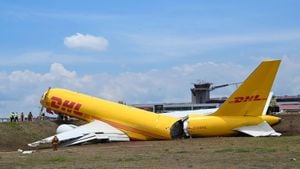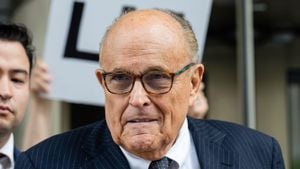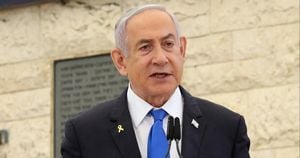German Chancellor Olaf Scholz has reached out to Russian President Vladimir Putin, initiating the first publicly acknowledged conversation between the two leaders since December 2022. This significant dialogue took place just as the Ukraine conflict nears its 1,000th day. Scholz's call to Putin came amid rising tensions and uncertainties about the direction of U.S. foreign policy under the incoming administration of President-elect Donald Trump, who has been skeptical about the extent of American military aid to Ukraine.
During the hour-long conversation, government spokesman Steffen Hebestreit reported, Scholz urged Putin to engage earnestly in negotiations with Ukraine. The chancellor’s message highlighted Germany’s commitment to supporting Ukraine against Russia’s aggression—an aggressive stance since the invasion began back in February 2022. He insisted on the necessity for Russia to withdraw its troops and bring the fighting to an end.
Scholz's call is particularly notable as it aligns with broad speculation surrounding the incoming leadership of Donald Trump, who has previously questioned the scale of U.S. aid to Ukraine. It's unclear how Trump's presidency will alter the dynamics of European support for Ukraine, which has heavily relied on Washington's backing to counter Russian advances.
Scholz’s communication stems from Germany's urgent need to respond to perceived shifts in the international political climate. Within his own borders, Scholz faces domestic challenges, including calls for political accountability and confidence votes as his government grapples with the ramifications of prolonged conflict and its impact on German society and economy.
Putin, on the other hand, responded to Scholz’s peace overtures by reiteratively framing Russia’s actions as defensive. According to the Kremlin, Putin asserted any peace agreement must account for Russia's territorial gains made during the conflict and include security guarantees, including Ukraine abandoning its aspirations to join NATO. The Russian President described NATO’s actions as provocative, implicatively blaming the West for the escalation of conflict.
This latest exchange has drawn criticism from Ukrainian President Volodymyr Zelensky, who expressed concern it might serve to embolden Russia’s position rather than facilitate meaningful dialogue. Zelensky labeled the conversation as potentially opening a “Pandora's box,” where more discussions could lead to empty negotiations favorable to Russian interests. He emphasized this could weaken Russia’s isolation, which Ukraine and its allies have worked to maintain through international sanctions and diplomatic measures.
The backdrop of these conversations is stark: The conflict has resulted in significant human losses and destruction. Scholz condemned recent Russian airstrikes targeting Ukrainian civilian infrastructures, describing them as reprehensible. He also highlighted the troubling development of North Korean troops reportedly being sent to Russia, purportedly to assist in the combat efforts against Ukraine, complicatively threatening to escalate the conflict even more.
Despite the grave circumstances, Scholz's resolve to communicate with Putin showcases Germany's attempt to navigate the contentious waters of international diplomacy. The nature of these conversations remains openly debated, with both leaders expressing their willingness to keep lines of communication open, but lacking any convergence of opinions indicative of meaningful progress.
Analysts interpret these communications as symbolic rather than substantive movements toward peace. The conversation reflects the complex reality facing both European leaders and Kremlin officials, as they grapple with the need for dialogue against the harsh realities of military engagement and the humanitarian crisis plaguing Ukraine.
While Scholz's urging for peace talks could signal Europe’s desire to eventually resolve the conflict, it simultaneously reveals the political tightrope he walks on the domestic front amid calls for accountability and discontent surrounding the prolonged war. The dynamic nature of this situation means both hopes and concerns will continue to shape the discourse surrounding the conflict.
The interplay between Scholz's diplomatic overtures and Ukraine's resilience against Russian advances will remain pivotal as global leaders watch closely to see if these talks can pave the way for any lasting peaceful resolution.



